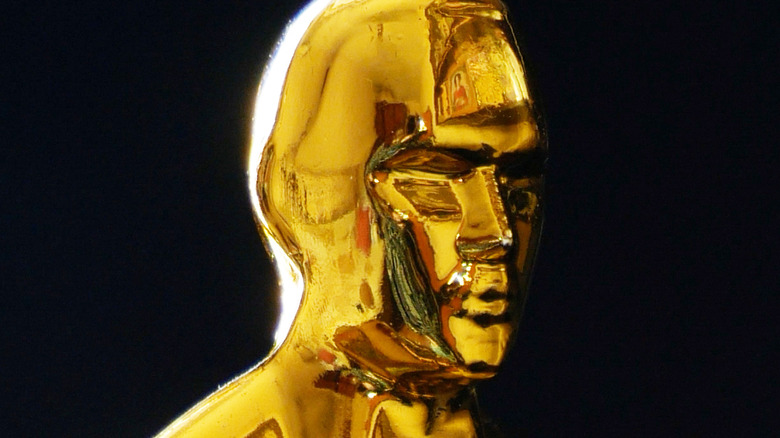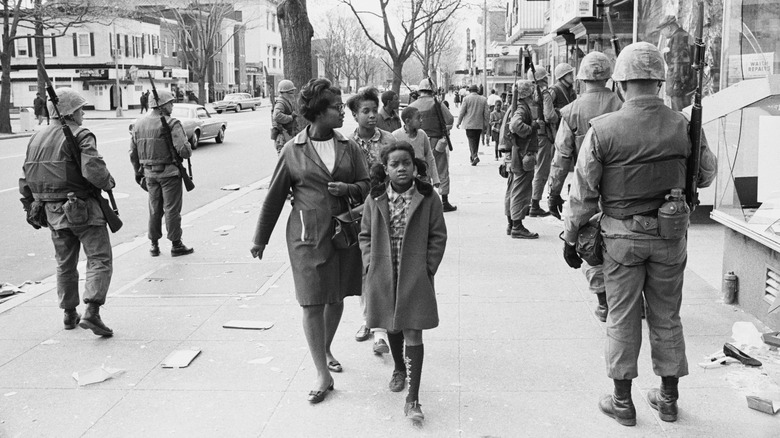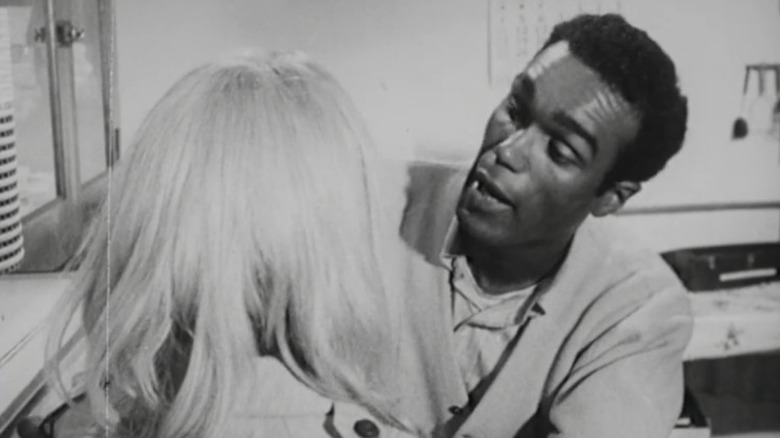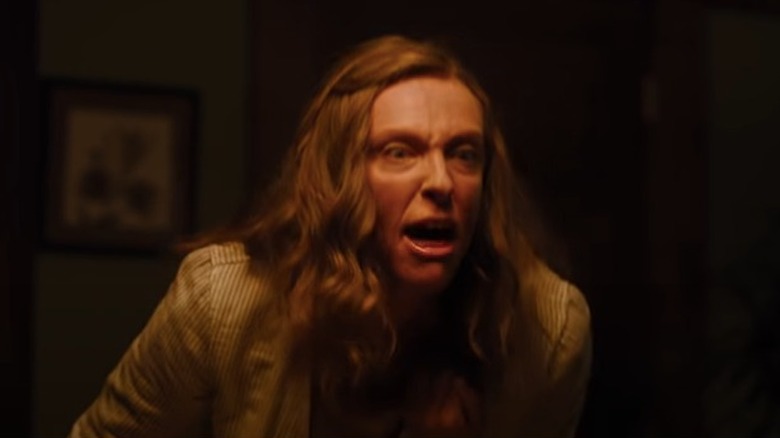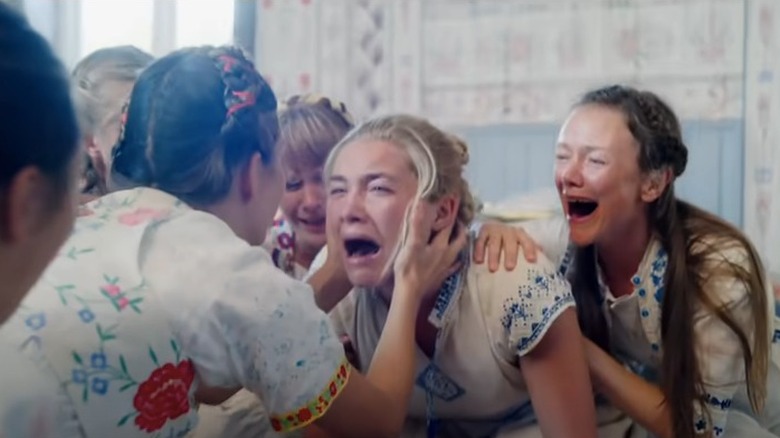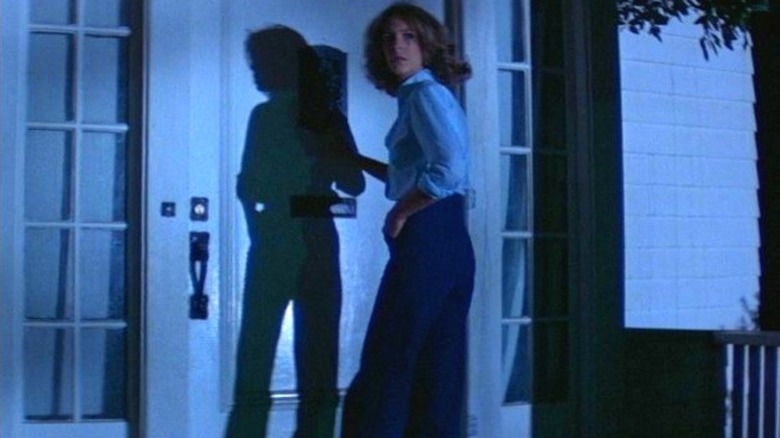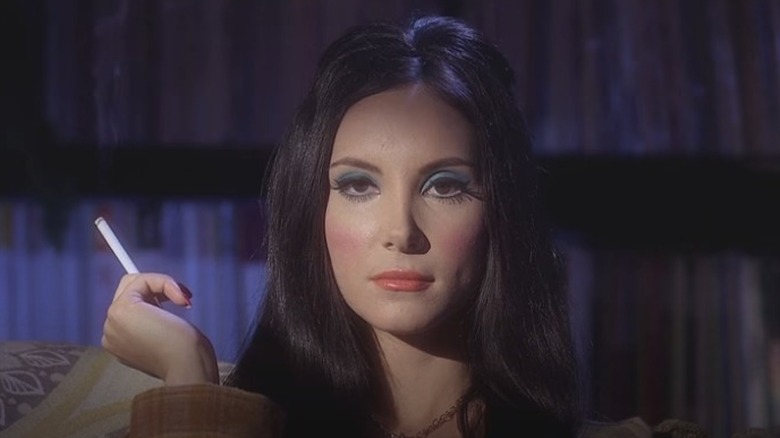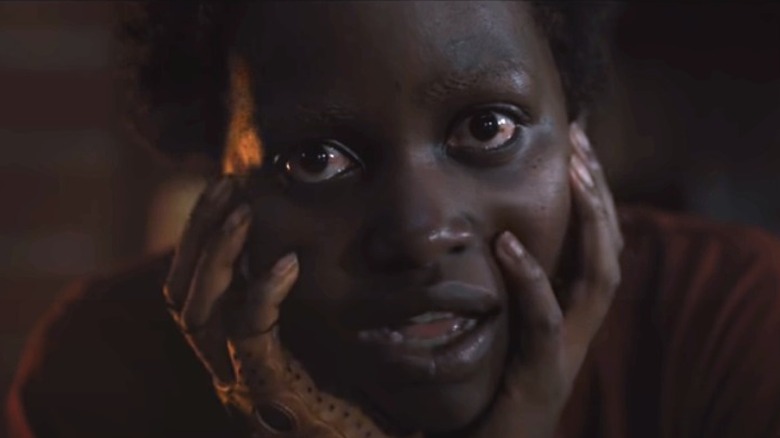The Major Oscars Problem That More People Should Be Talking About
In the late winter of 2020, amidst the fear and confusion brought on by the outbreak of a little-known and even less understood virus, Americans found an age-old means of coping with their anxieties. By March of that year, Steven Soderbergh's "Contagion" — a 2011 horror film about the fear and confusion brought on by the outbreak of a little-known and even less understood virus — skyrocketed to the second most-watched Warner Bros. film on iTunes (via Vulture). The correlation was notable, but not particularly surprising. Even the ancient Greeks understood that to ignore or deny the darkness around us and within us is to risk being overcome by it (see: the Dionysian myth of The Bacchae in Thebes).
And yet, despite the long-understood role of horror — and despite the cultural, cinematic, sociological, and psychological significance of horror films — the genre has been (and continues to be) largely ignored by the Academy.
Given its ability to both investigate our most inherent fears and capture and comment on a particular era's manifestation of those fears, the Academy's dismissal of horror suggests a need to preserve antiquated attitudes about both art and society. Since making room for it alongside the awards show's long-celebrated period pieces, biopics, classic lit adaptations, and sparkly song and dance pics is both unlikely — and in all fairness, incredibly complicated, given horror's unique mechanics and purport — it's time to consider adding an all-new category to the repertoire, one that would allow the most historically avant-garde and necessary genre a seat at the table.
Horror narratives are a social necessity
From the late spring to early fall of 1967, over 80 Americans died, and 17,000 more were arrested during a series of volatile confrontations over racial injustice euphemistically dubbed the "long, hot summer" (via History). Though the Civil Rights Act had been signed into law three years prior, both contemporary Gallup polls and the ongoing racial conflict that permeated the country made clear that a large percentage of white America disapproved of both the legislation and the future it suggested. By June of the following year, both Martin Luther King Jr. and Robert Kennedy would be assassinated.
1968 has long been noted for its abundance of tumult, both national and international. The Tet Offensive happened in 1968, as did the My Lai Massacre. That February, it was announced that the US had just seen its highest casualty toll to-date in the already widely-disapproved of Vietnam War (via History). Across the country, Americans on every side of the numerous and simultaneous sociopolitical and moral debates were consumed, alternately, by the hate, fear, outrage, anxiety, and immense grief of the tempestuous year.
Elsewhere, in the world of cinema, a groundbreaking and genre-defining feature film debut from a 28 year-old director hit theaters on October 1st. The film, made on a shoestring budget of just $114,000 (via The Numbers), efficiently and poignantly captured the mood of the nation. What's more, it subtly forced much of its audience to contend with and confront the root cause of their own hate and bigotry: fear.
The Oscars snubbed 1968's most significant release — a horror film
The most culturally important film of that year was George A. Romero's "Night of the Living Dead," a watershed moment in horror long credited with defining (if not necessarily creating) the zombie genre, despite the fact that his re-animated corpses were referred to exclusively as "ghouls" (via CMU Library). In fairness, the Academy couldn't have foreseen the whole "popular genre-sparking" thing at the time, but that's the least of what made the movie Oscar-worthy, anyway. What was truly notable about "Night of the Living Dead" was Romero's now-obligatory "survivor who takes charge" is a Black man named Ben (Duane Jones).
The film forced white audiences to sympathize with a Black character, but not before forcing them to meet their fear of being "told what to do" by Black communities. In a tragic twist, just as those fears have officially given way to empathy and to cheering Ben's survival, the hero is shot and killed by a white lynch mob — a maneuver as effective in 2022 as it was in 1968. To this day, numerous artists use the template of the undead masses as means of manifesting society's most immediate anxieties. While Romero's ghouls spoke, in part, to much of white America's fear of being overcome by marginalized populations, modern cinema's zombies speak simultaneously to our eternal fear of losing agency, and to the more specific fear that — in our ever-increasing dependence on virtual connection over human connection — we're becoming zombies ourselves.
But for all its immediate and lasting relevance, "Night of the Living Dead" went unacknowledged at the Oscars. In 1969, the award for Best Picture went to "Oliver!" a largely forgotten adaptation of Lionel Bart's musical, itself loosely based on Dickens' "Oliver Twist."
Exceptions aren't evidence of acceptance
If you're thinking, "Fair enough, but that was 1969 — the Oscars have come a long way since then," then we regret to inform you that, by and large, they have not. Yes, there have been some exceptions over the years (e.g. "The Exorcist," "Rosemary's Baby," and Best Picture winner "Silence of the Lambs"), but the very fact that they are exceptions only further illustrates the point. So, too, does the 2017 Oscars' obsession with a musical that (unlike Romero's film) unintentionally reflected a large percentage of the nation's nostalgia-driven politics (via Paste). Granted, "La La Land" didn't actually win Best Picture. Nevertheless, it elicited an abundance of Academy swooning while revolutionary works like Anna Biller's critically-acclaimed "The Love Witch" (via Rotten Tomatoes) — a feminist horror film that concerns itself with "nostalgia" in a decidedly more meaningful way — went unacknowledged by the gatekeepers of cinema.
The Academy would repeat this dismissal of groundbreaking horror even as society moved into what's frequently been dubbed a "horror renaissance" (via The Guardian). In 2019, for instance, the white savior story "Green Book" took home the award for Best Picture (via Insider), while Ari Aster's gutting and innovative "Hereditary" — a meditation on the desperation, horror, pain, and lack of agency felt by broken families — didn't even earn Toni Collette a much-deserved Best Actress nomination. This is part of the problem with ignoring horror. The genre lends itself to brilliant, complex, difficult performances (also see: Lupita Nyong'o in Jordan Peele's "Us") but if the film itself isn't considered for an award, its performances fall similarly by the wayside.
The Academy has left too many contenders for dead
Surprisingly, the Academy did manage to recognize the brilliance of "Get Out" and "Parasite," but it's failed so many deserving horror films in recent years that its handful of acknowledgments pale in comparison to its body count.
Among the many socially relevant and cinematically forward horror films ignored by the Oscars are: Neil Marshall's psychologically suffocating "The Descent" (2005), Tomas Alfredson's "Let the Right One In" (2008), Soderbergh's prescient "Contagion" (2011), Drew Goddard's "The Cabin in the Woods" (2011), Scott Derrickson's "Sinister" (2012), David Robert Mitchell's "It Follows" (2014), Jennifer Kent's "The Babadook" (2017), Robert Eggers' eternally relevant "The VVitch" (2015), Darren Aronofsky's divisive "Mother!" (2017), David Gordon Green's timely re-exploration of the original Final Girl, "Halloween" (2018), and, most egregiously, Ari Aster's grief-excising "Midsommar" (2019). In 2021, the Academy snubbed Leigh Whannell's reboot of "The Invisible Man" — a chilling mediation on gaslighting, abuse, stalking, and a society that doesn't believe women — in the same year Congress finally moved on H.R. 1906: the Protecting Domestic Violence and Stalking Victims Act (via Congress).
In fairness, it is difficult to compare the Academy's beloved biopics, pretty period pieces, and classic lit adaptations (even the sixth of their kind) with films like the aforementioned. That's because on a fundamental, mechanical level, horror doesn't operate the same way other genres do.
Horror is a whole different monster, but one equally deserving of love
Not unlike animated movies, horror is able to do things with — and to — its characters (and subsequently say things through them) that other genres simply can't. Successful horror — that is, horror worthy of the Academy's attention — is always doing one thing while actually saying another. Moreover, that the question of what it's actually saying remains subjective and at the mercy of the individual viewer's own fears and anxieties (and is even, occasionally, understood only subconsciously) is integral to the genre's DNA. In other words, horror doesn't deliver a thesis. It delivers (elicits) a reaction, and it is from that reaction that the viewer must cobble together their own conclusion and takeaway. This occasionally happens in other genres, but it's both a requirement and an inevitability of horror.
Even more importantly, horror is a proactive viewing experience, to a degree that other genres aren't. In effective horror, a viewer literally can't help but put themselves in the scene, and ask themselves what they might do in the same situation. Again, this simply isn't true of other genres. Nobody sits down to watch "Fried Green Tomatoes" and inadvertently ends up screaming "Don't go in there!"
All this is to say nothing of horror's ability to experiment cinematically, and subsequently advance the medium as a whole (via No Film School). Simply put, horror operates differently from other narrative forms, and asks different things of its audience — namely, prolonged, radical, uncomfortable empathy — which is precisely why the Academy needs to consider giving it its own category at the Oscars.
Horror has guts, and the Academy should, too
The argument that giving a "sub-genre" its own category at the Oscars would be a slippery slope (where does it end?) doesn't apply to horror, because horror isn't a sub-genre. Like documentary and animated films, horror is an umbrella. Any sub-genre, from satire to sci-fi to superheroes, can be a horror film. By recognizing that distinction, and by finally acknowledging the importance of the genre, the Academy could potentially pull itself into the 21st century. For (quite literally) millennia, horror has been integral to our growth and development as human beings. In more recent decades, its grown ever more adept at relaying a given culture or era's specific fear-bred shortcomings as audiences (though not, apparently, the Academy) grow ever more adept at interpreting and understanding the medium.
In Episode 4 of Eli Roth's "History of Horror" series, Karyn Kasuma of "The Invitation" points out that, in her words, "[Horror is] one of the few genres that's had the guts to say, as a culture, we are terrified of women and girls." In the Oscar-snubbed "Us," Peele uses the self-reflexive horror of the doppelgänger to explore class divide and privilege-induced blindness. Both of these commentaries seem perfectly in-keeping with the Academy's self-satisfied and broadly-stated ethos (via Twitter), so it's both curious and hypocritical that the Oscars are still so reluctant to embrace the genre.
It isn't as if, each year, there aren't plenty of relevant horror films to choose from. In fact, evidence suggests that audiences are more desperate than ever to see their anxieties given some semblance of narrative structure (via Nautilus).
The Oscars have an obligation to face their fear
In his 1969 response to "Night of the Living Dead," Roger Ebert was troubled by the fact that very young children were permitted to see the film. But there are moments in his musing that seem not to apply to literal children at all, but to anyone too comfortable in their naïveté. In his piece, Ebert writes: "The movie had stopped being delightfully scary about halfway through, and had become unexpectedly terrifying. There was a little girl across the aisle from me, maybe nine years old, who was sitting very still in her seat and crying [...] I saw kids who had no resources they could draw upon to protect themselves from the dread and fear they felt."
Of course, that's exactly what horror, at its best, is intended to do. Horror forces us to search for those resources, and in doing so, becomes a resource, or proxy, through which we might confront, admit to, act-out, examine, or release that fear and dread — a vital and noble intention in a world that is, quite frequently, horrifying.
This isn't to say films more concerned with escapism aren't equally worthy of praise. But the apparent notion that horror is somehow less worthy isn't just ignorant, it's harmful. Unlike other genres, horror is at once timeless, and entirely reflective of its specific time and place. Similarly, since the fear of our own mortality and the biological compulsion to survive are universal and hardwired, horror is able to communicate not just across time, but across cultures. In essence, horror is the spoonful of sugar (or red food coloring, Kodak Photo-Flo, and corn syrup) that helps the medicine go down, and as the arbitrator of what people should be seeing, considering, and talking about, the Oscars have a social obligation to take it seriously — even if that means acknowledging it as a different form of art altogether.
